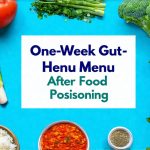Food poisoning and travel-related gastrointestinal illnesses are unfortunately common experiences, disrupting lives with unpleasant symptoms like nausea, vomiting, diarrhea, and abdominal pain. These episodes don’t just cause immediate discomfort; they significantly impact the delicate ecosystem within our gut – the gut microbiome. This disruption, often referred to as dysbiosis, can lead to lingering digestive issues, weakened immunity, and even affect mental wellbeing. Simply waiting for symptoms to subside isn’t always enough. A proactive approach focusing on restoring a healthy gut microbiome is crucial for full recovery and preventing long-term consequences. Understanding how probiotics fit into this restoration process is key to navigating post-illness health effectively.
The gut microbiome, comprised of trillions of bacteria, fungi, viruses, and other microorganisms, plays an essential role in digestion, nutrient absorption, immune function, and even mental health. When a foodborne pathogen or travel-related illness wreaks havoc, it doesn’t just kill off the ‘bad’ bacteria; it often indiscriminately disrupts the balance, reducing the diversity and overall population of beneficial microbes. This imbalance creates an opportunity for harmful bacteria to flourish, exacerbating symptoms and hindering recovery. The goal isn’t necessarily about eliminating all bacteria, but restoring a healthy equilibrium within the gut ecosystem, where beneficial microorganisms can outcompete pathogens and support optimal function. Probiotic supplementation, alongside dietary adjustments, offers a targeted strategy to aid in this restoration process. For those needing more tailored guidance after illness, consider top tests for tracking gut repair.
Understanding Probiotics & Their Role Post-Illness
Probiotics are live microorganisms that, when administered in adequate amounts, confer a health benefit on the host. They’re not a one-size-fits-all solution; different strains have different properties and effects. Many commonly available probiotic supplements contain species of Lactobacillus and Bifidobacterium, but hundreds of other potentially beneficial strains exist. After food poisoning or travel illness, probiotics can help in several ways: – Re-establishing a healthy microbial balance by replenishing beneficial bacteria populations. – Strengthening the gut barrier function, reducing permeability (“leaky gut”) and preventing further inflammation. – Competing with pathogenic bacteria for resources and adhesion sites in the gut, limiting their ability to colonize. – Producing short-chain fatty acids (SCFAs), like butyrate, which nourish gut cells and have anti-inflammatory properties.
Choosing the right probiotic isn’t simply about picking a brand with the highest CFU (colony forming units) count; it’s about selecting strains that are relevant to your specific situation. While high CFU counts indicate potency, strain specificity is often more important for targeted benefits. For example, certain Lactobacillus strains have been shown to be particularly effective in reducing diarrhea associated with antibiotic use or traveler’s diarrhea, while others might better support immune function. It’s vital to remember that probiotic supplements are generally considered safe for most people, but it’s always best to consult a healthcare professional before starting any new supplement regimen, especially if you have underlying health conditions or a compromised immune system. Planning ahead for gut health is possible too – learn how to build a travel kit to mitigate risks.
The timing of probiotic introduction is also critical. Introducing probiotics during acute symptoms (severe diarrhea and vomiting) may not be the most effective approach as the gut environment isn’t receptive to colonization. Instead, focusing on rehydration and allowing the initial inflammatory response to subside slightly before introducing probiotics is generally recommended. Once bowel movements start to normalize, incorporating a probiotic can provide targeted support for rebuilding the microbiome. A gradual introduction, starting with lower doses and gradually increasing them as tolerated, can also minimize any potential digestive upset.
Selecting The Right Probiotic Strain
The sheer variety of probiotics available can be overwhelming. It’s crucial to move beyond marketing hype and focus on evidence-based strain selection. Saccharomyces boulardii, a non-pathogenic yeast probiotic, is often recommended for restoring gut health after acute diarrhea caused by food poisoning or travel illness. Studies have shown it can help reduce the duration of diarrhea, lessen symptoms, and prevent relapse. Specific strains within Lactobacillus are also frequently used: – Lactobacillus rhamnosus GG: Well-studied for its ability to improve gut barrier function and reduce inflammation. – Lactobacillus acidophilus: Commonly found in yogurt and supplements; it can help restore microbial balance and support digestion. – Bifidobacterium infantis: Beneficial for individuals experiencing IBS-like symptoms post-illness, as it helps modulate the immune response.
It’s important to consider your individual needs and the specific cause of your illness when choosing a probiotic. If your food poisoning was caused by a bacterial toxin (e.g., Staphylococcus aureus), focusing on strains that can neutralize toxins or strengthen the gut barrier might be beneficial. For travel-related diarrhea often caused by E. coli, selecting probiotics with proven efficacy against this pathogen may be more effective. Reading product labels carefully and looking for products that clearly identify the strain (e.g., Lactobacillus rhamnosus GG rather than just “Lactobacillus”) is essential. Look for third-party tested supplements to ensure quality and accuracy of label claims. To understand what you’re buying, how to read food labels can be incredibly useful.
Beyond strain selection, consider factors like shelf life and storage requirements. Some probiotics require refrigeration, while others are shelf-stable. Choose a product that fits your lifestyle and ensures the viability of the microorganisms. Furthermore, remember that probiotic supplements are generally considered safe for most people, but it’s always best to consult a healthcare professional before starting any new supplement regimen, especially if you have underlying health conditions or a compromised immune system.
The Role Of Prebiotics & Dietary Changes
Probiotics work most effectively when paired with prebiotics – non-digestible fibers that serve as food for beneficial bacteria in the gut. Incorporating prebiotic-rich foods into your diet can significantly enhance the effectiveness of probiotic supplementation. Excellent sources include: – Garlic and onions – Leeks and asparagus – Bananas (slightly green are best) – Oats and barley – Apples These foods provide fuel for probiotics, allowing them to thrive and multiply within the gut.
Dietary adjustments during recovery are equally important. A bland diet that’s easy to digest can reduce stress on the digestive system while it’s healing. This might include: 1. Rice porridge or white rice 2. Steamed vegetables (carrots, potatoes) 3. Boiled chicken or fish 4. Bananas and applesauce Avoid foods that are difficult to digest or may exacerbate symptoms, such as fatty foods, spicy meals, dairy products (if lactose intolerant), caffeine, and alcohol. Gradually reintroduce foods as tolerated, paying attention to how your body responds. If you’re struggling with nausea, having best pantry staples on hand can make a big difference.
Furthermore, staying well-hydrated is critical, especially after episodes of vomiting or diarrhea. Water replenishes fluids lost and supports optimal digestive function. Consider incorporating electrolyte solutions to restore minerals lost through fluid loss. Fermented foods, such as yogurt (with live cultures), kefir, sauerkraut, and kimchi, can also provide a natural source of probiotics and prebiotics, further supporting gut health. However, introduce these slowly and cautiously if you’re still experiencing digestive sensitivity. Ultimately, a holistic approach combining targeted probiotic supplementation, prebiotic-rich diet, and mindful dietary adjustments is the most effective strategy for restoring gut health after food poisoning or travel illness. For more information on dietary support during recovery, consider preparing simple meals. A focus on gentle gut healing meals can also be very beneficial. And, remember that full digestive recovery after illness takes time and a holistic approach.


















